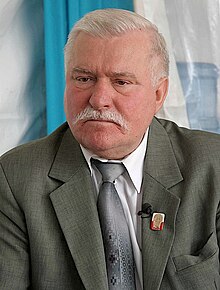Lech Walesa
| Lech Wałęsa | |
|---|---|

Wałęsa in 2009
|
|
| 2nd President of Poland | |
|
In office 22 December 1990 – 22 December 1995 |
|
| Prime Minister |
Tadeusz Mazowiecki Jan Krzysztof Bielecki Jan Olszewski Waldemar Pawlak Hanna Suchocka Waldemar Pawlak Józef Oleksy |
| Preceded by |
Wojciech Jaruzelski (PRL) Ryszard Kaczorowski (in exile) |
| Succeeded by | Aleksander Kwaśniewski |
| Chairperson of Solidarity | |
|
In office 14 August 1980 – 12 December 1990 |
|
| Preceded by | Position established |
| Succeeded by | Marian Krzaklewski |
| Personal details | |
| Born |
29 September 1943 Popowo, Poland |
| Political party |
Solidarity (1980–1988) Solidarity Citizens' Committee (1988–1993) Nonpartisan Bloc for Support of Reforms (1993–1997) Solidarity Electoral Action (1997–2001) Christian Democracy of the 3rd Polish Republic (1997–2001) Civic Platform (2001–present) |
| Spouse(s) | Mirosława Danuta Gołoś (1969–present) |
| Children | Bogdan (1970) Sławomir (1972) Przemysław (1974-2017) Jarosław (1976) Magdalena (1979) Anna (1980) Maria Wiktoria (1982) Brygida (1985) |
| Parents | Bolesław Wałęsa Feliksa Kamieńska |
| Occupation | Electrician |
| Religion | Roman Catholicism |
| Signature |  |
Lech Wałęsa (/ˌlɛx vəˈwɛnsə/); Polish: [ˈlɛx vaˈwɛ̃sa]; born 29 September 1943) is a retired Polish politician and labor activist. He co-founded and headed Solidarity (Solidarność), the Soviet bloc's first independent trade union, won the Nobel Peace Prize in 1983, and served as President of Poland from 1990 to 1995.
Wałęsa's alleged collaboration with the communist secret police has been a disputed issue since the fall of Communism in Poland. Eventually, following a long investigation, in 2017 the Institute of National Remembrance concluded that a handwriting study proves the authenticity of documents suggesting that Wałęsa had collaborated with the communist secret police.
Wałęsa was an electrician by trade. When working at Lenin Shipyard (now Gdańsk Shipyard), he became a trade union activist, for which he was persecuted by the Communist authorities, placed under surveillance, fired in 1976, and arrested several times. In August 1980 he was instrumental in political negotiations that led to the ground-breaking Gdańsk Agreement between striking workers and the government. He became a co-founder of the Solidarity trade union movement. After martial law was imposed in Poland and Solidarity was outlawed, Wałęsa was arrested again. Upon his release from custody he continued his activism and was prominent in the establishment of the 1989 Round Table Agreement that led to semi-free parliamentary elections in June 1989, and to a Solidarity-led government.
...
Wikipedia
